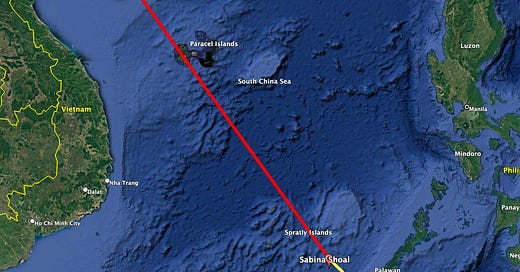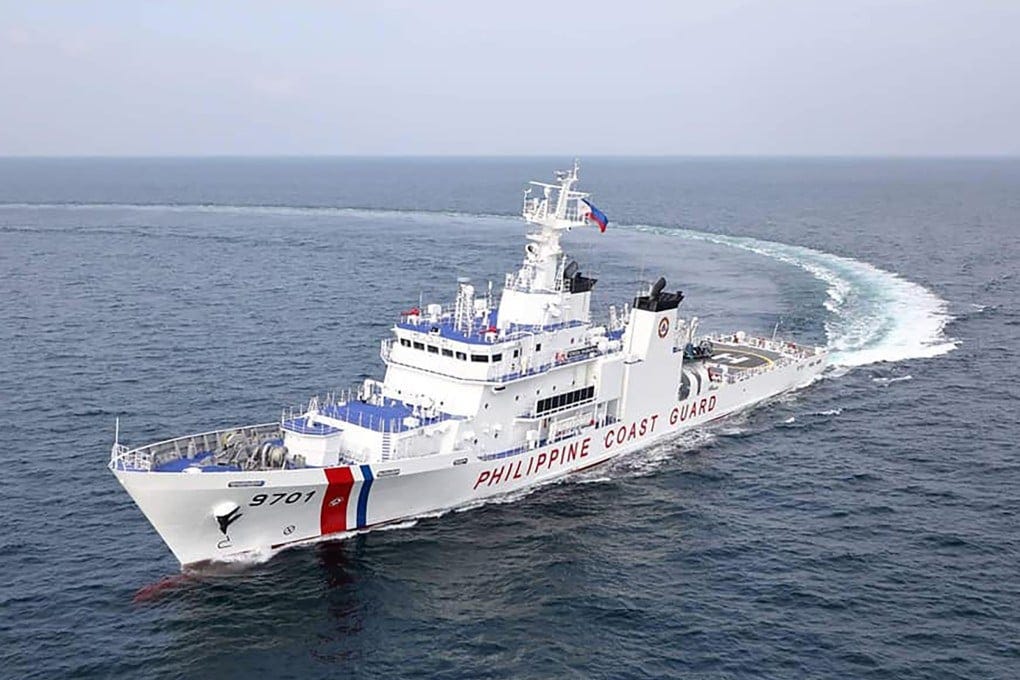If you take a cold eye to what the People’s Republic of China (PRC) has been up to this century in the South China Sea, you have to give them a nod of respect.
Slow, steady, sure, unbowed, undeterred, careful, cunning, and confident.
When you compare that record to ours this century—from Afghanistan to Iraq, Syria, and our own borders—little more commentary is needed.
As you read the below, remember that the Philippines is a treaty ally of the USA with over a century and a quarter of close relationship with us - and a history of blood and strife, a little between us, but mostly side by side.
The PRC knows this, and that makes it all the more succulent.
You also need to, as always, keep in mind the chart.
The shoals in question are 638 nautical miles (red) from the PRC, and 78 nautical miles (yellow) from The Philippines.
The crew of BRP Teresa Magbanua (MRRV-9701) endured hunger and thirst for weeks after Chinese forces blocked resupply missions to the Philippine Coast Guard ship guarding the Sabina Shoal.
According to Joseph Morong’s exclusive report in 24 Oras on Monday, over 60 crew members of the vessel guarding the Escoda Shoal in the West Philippine Sea had to make do with lugaw or rice porridge for three weeks.
A quick note about BRP Teresa Magbanua, she is only a couple of years old and built by the Japanese.
She has been doing serious business for her nation.
Manila recalled the BRP Teresa Magbanua from Sabina Shoal over the weekend after a five-month deployment, citing bad weather, depleted supplies and the need to evacuate personnel requiring medical care.
There is an opening here that needs to be watched closely;
Analysts say the sudden withdrawal could allow for the rotation and resupply of troops stationed on the BRP Sierra Madre, a WWII-era ship deliberately grounded by the Philippines at another disputed South China Sea feature, Second Thomas Shoal.
Sherwin Ona, a political-science professor at De La Salle University in Manila, expressed concern that China would exploit the situation.
“It’s crucial to sustain our presence,” he said. “The Chinese might continue their reclamation. There’s evidence of reclamation already with the discovery of crush corals.”
The Philippine coastguard currently has only two vessels capable of long-term deployment at Sabina Shoal – BRP Teresa Magbanua and BRP Melchora Aquino. The larger BRP Gabriela Silang, with its aluminium hull, would be less suited to the task, Ona said.
If China took control of the shoal “it would be difficult for us because the Chinese implement law enforcement” and view the presence of Filipinos as a violation of their laws, Ona said.
Echoing these concerns, Carl Thayer, an emeritus professor at the University of New South Wales, said that the Philippines should have ensured a replacement vessel was in place before withdrawing the Teresa Magbanua.
What are we doing to help our friends in the Philippines?
Ona is spot on. The PRC has a track record of changing facts on the ground simply by saying, “possession is 9/10 of the law,” and daring anyone to do anything about it. No one has called their bluff yet.
I’m not sure what more the Philippine Coast Guard could have done:
Aside from these deprivations, the safety of BRP Teresa Magbanua’s crew was also jeopardized after a China Coast Guard ship intentionally and repeatedly rammed into the Filipino vessel last August 31.
One of the damaged portions was near the Magbanua’s engine room.
“Kapag ito nadali, sir, dead on the water, pwede na kaming, may rason na silang i-salvage kami kasi dead on the water, pwede kaming hilahin,” said Duran.
(If this was heavily damaged, we would have been dead in the water. They will have a reason to salvage the ship since we had no power, we could have been towed away.)
The BRP Teresa Magbanua was reported to have departed Escoda Shoal on Sunday after being on station in the disputed area since April 15.
“Humihingi kami ng tawad, sir. Kailangang makabalik yung barko para sa tauhan,” said Duran, who was near tears when he reported to his superior officers after his ship returned to Puerto Princesa in Palawan on Sunday.
(I ask for forgiveness, sir. The ship needed to return because of my crew’s welfare.)
The Philippine Coast Guard, however, said it understood the situation of the Magbanua’s crew.
“The decision for you to reposition yourself is to ensure that we are able to sustain our ability to secure this part of the country in the long haul,” said PCG Commandant Admiral Ronnie Gil Gavan. “You have accomplished your mission.”
So, everyone waits, again, to see how PRC the bully will act.
Our “international community” is simply worthless. There really is no such thing as “international law” if only one side respects it. All the bleating about imperialism of centuries ago, yet there is it - right in front of everyone - yet silence.
The Green/Red self-loathing in the West - perfectly demonstrated by the willful destruction of their economy by the German ruling class - screams about carbon … yet ignores the facts of the below graph via Virtual Capitalist:
Where are the protests? Where are the demands for action?
To ask the question is to answer it.
Besides desiring governments with a realistic view of the world and focused on the needs of their citizens instead of their social credit score, what are people to do?
Well, re-reading the top of the post, there is a little something. The “Gulf of Mexico” is not owned by Mexico, but they aren’t claiming it. The South China Sea is not Chinese, but just because of the name, they think it is.
Well, perhaps we can pick up something from the plucky Philippines. It isn’t the “South China Sea”, no, it is the “West Philippine Sea.”
I like that.







CDR Sal, excellent framing of a very complex situation. Since "international law" is not backed up by "international law enforcement" that is credible and sufficient, it is useless as a forced compliance mechanism for actors who care not for the umbrage and outrage of international law "experts". These "experts" may even be correct that by the letter of "international law" the PI is in the right. To my "non-expert" opinion they certainly are. But what are "we" (the U.S. and "international community") willing and / or capable of doing about it? China's attitude of "possession is 90 percent of the law" is probably legally defensible in "international law" (I'll leave that for the "experts"). As a practical matter, once someone has "boots on the ground", you either have to coerce their government via diplomatic or economic pressure (sanctions? tariffs?) to leave voluntarily, or remove them via physical force. Which is by its nature escalatory and opens up all sorts of possibilities for mistakes spiraling out of control. Deterrence requires both parties to understand red lines, capabilities and potential consequences. IMO we have failed, and are continuing to fail in the region. We may not be seeing that at the policy making level, but the other regional actors (Japan, S. Korea, Viet Nam, PI) are well aware of what is happening, and have to be asking if they can really count on the U.S. to honor its treaty obligations.
When we are forced to buy electric skateboards for transportation by the Harris administration they will be produced in Chinese factories powered by coal.
Our leaders have failed the Philippines as well as everyone else , except the Chinese.